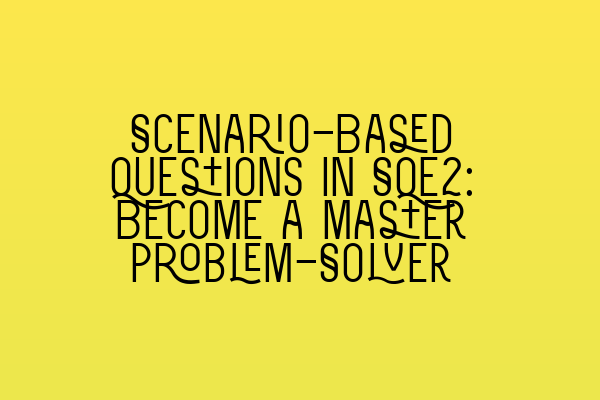Scenario-Based Questions in SQE2: Become a Master Problem-Solver
As you prepare for the Solicitors Qualifying Examination (SQE) SQE2 assessments, you’ll encounter a variety of question formats designed to test your legal knowledge and problem-solving abilities. One such format is scenario-based questions, which require you to analyze a given situation and provide a well-reasoned response based on legal principles.
In this article, we will delve into the world of scenario-based questions in the SQE2 exam and provide you with valuable tips and strategies to excel in this type of assessment. So, grab your pen and paper, and let’s get started!
The Purpose of Scenario-Based Questions
Scenario-based questions are designed to assess your ability to apply legal principles to real-life situations. These questions simulate the challenges you may face as a practicing solicitor, where you will need to analyze complex scenarios, identify legal issues, and arrive at logical conclusions.
By including scenario-based questions in the SQE2 exam, the assessors can evaluate your critical thinking skills, legal reasoning, and practical application of legal knowledge. These questions test your ability to spot relevant facts, explain legal concepts, and provide reasoned advice to clients.
How to Approach Scenario-Based Questions
Now that we understand the purpose of scenario-based questions, let’s explore some effective strategies to help you master this question format:
1. Carefully Analyze the Scenario
Start by thoroughly reading and understanding the given scenario. Identify the key facts, legal issues, and any relevant information that can influence your analysis.
Remember to pay close attention to the facts presented in the scenario, as they may contain subtle clues and nuances that can impact your answer. Consider the parties involved, their actions, and the legal context surrounding the situation.
2. Identify the Legal Issues
Once you have a clear understanding of the scenario, pinpoint the legal issues that arise from the facts provided. These may include contractual disputes, negligence claims, regulatory compliance, or any other relevant areas of law.
Creating a mental or written list of the legal issues will help you stay organized and ensure you address each issue in your response. Be precise and concise in your identification of the legal issues.
3. Apply Legal Principles
Next, apply your knowledge of legal principles to the identified issues. Consider relevant statutes, case law, legal doctrines, and any other applicable legal sources. Begin by outlining the general legal principles that are relevant to the case.
It’s important to explain how each legal principle applies to the given scenario. Analyze the facts in relation to the applicable law and provide a well-reasoned argument or advice based on your analysis.
4. Consider Counterarguments
To strengthen your response, consider the possible counterarguments that may arise in the scenario. This demonstrates your ability to think critically and anticipate opposing viewpoints.
Addressing counterarguments allows you to showcase your comprehensive understanding of the legal issues and provide a balanced analysis. It shows that you have considered different perspectives before arriving at your conclusion.
5. Provide a Clear and Well-Structured Response
When writing your response, ensure that your answer is clear, concise, and well-structured. Start with a brief introduction that outlines the main legal issues, then move into a systematic analysis of each issue.
Use headings, subheadings, and paragraphs to maintain a logical flow in your response. Avoid unnecessary repetition and focus on providing relevant and accurate information. Use case examples or legal authorities to support your arguments, where appropriate.
Recommended Resources to Enhance Your Preparation
To further refine your skills in scenario-based questions and SQE2 preparation, we recommend exploring the following related articles:
- Key Topics in SQE Land Law: A Roadmap to Exam Success
- SQE Prep: Essential Tips and Resources for Success in Property Practice
- Examining Land Charges: Implications and Considerations
- Understanding Landlord Responsibilities in the UK: Legal Obligations Explained
- Interactive SQE Mock Tests for Property: Sharpen Your Skills for Exam Success
These articles provide valuable insights, exam strategies, and resources to help you succeed in your SQE2 assessments.
Conclusion
Scenario-based questions in the SQE2 exam serve as a platform for you to showcase your problem-solving abilities and practical application of legal knowledge. By mastering the strategies outlined in this article, carefully analyzing scenarios, identifying legal issues, applying legal principles, and considering counterarguments, you can confidently navigate through these questions and excel in your SQE2 assessments.
Remember, practice is key. Utilize the recommended resources, including the related articles mentioned above, to enhance your preparation and gain the necessary skills to become a master problem-solver.
Good luck with your SQE2 exam preparations!

Leave a Reply